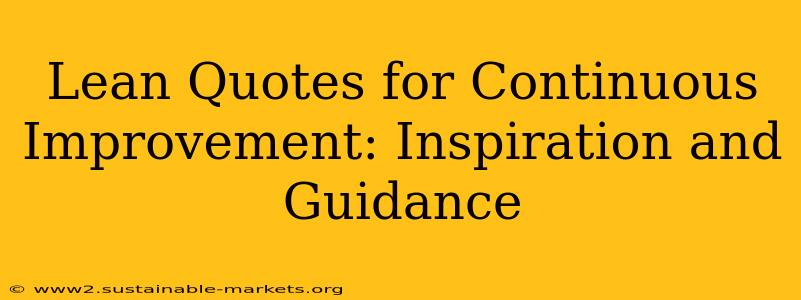Continuous improvement, a cornerstone of Lean methodology, isn't just about incremental changes; it's a mindset shift towards constant optimization. This philosophy, deeply rooted in efficiency and waste reduction, fuels innovation and drives organizational success. But sometimes, a powerful quote can be the spark that ignites that drive for improvement. This article explores inspiring lean quotes, providing context and guidance on how to apply their wisdom to your personal and professional life.
What is Lean Methodology and Continuous Improvement?
Before diving into the quotes, let's briefly define our terms. Lean methodology is a systematic approach to identifying and eliminating waste (muda) in any process, whether it's manufacturing, service delivery, or even personal tasks. Continuous improvement, often referred to as Kaizen, is the ongoing effort to enhance processes, products, and services, striving for perfection without ever truly arriving. It's a journey, not a destination. The two are inextricably linked: Lean provides the framework, and continuous improvement provides the engine.
Inspiring Lean Quotes and Their Applications
Here are some powerful quotes that embody the spirit of Lean and continuous improvement, followed by practical applications:
"The goal is to eliminate waste, not just to reduce it." — Unknown
This quote highlights the crucial difference between mere cost-cutting and true Lean implementation. Reducing waste is a good start, but eliminating it entirely requires a deeper dive into understanding the root causes of inefficiency. This involves:
- Value Stream Mapping: Visually representing the entire process to identify all steps adding or not adding value.
- 5 Whys Analysis: Repeatedly asking "why" to uncover the underlying causes of problems.
- Root Cause Analysis: Employing various techniques (e.g., fishbone diagrams) to pinpoint the core issues.
"Perfection is the enemy of good." — Voltaire (often misattributed to Einstein)
This seemingly paradoxical statement speaks to the importance of iterative progress. Striving for unattainable perfection can paralyze action and prevent the implementation of valuable improvements. The focus should be on making incremental, impactful changes rather than waiting for the "ideal" solution. This encourages:
- Rapid Prototyping: Creating quick and inexpensive versions of solutions to test and iterate.
- Minimum Viable Product (MVP): Developing a basic version with core functionalities to gather user feedback and refine it.
- Agile Methodology: Embracing flexibility and adaptability in the improvement process.
"The best way to predict the future is to create it." — Abraham Lincoln
This quote underscores the proactive nature of Lean and continuous improvement. Instead of passively reacting to problems, Lean encourages active shaping of the future by anticipating needs and proactively addressing potential issues. This involves:
- Predictive Maintenance: Anticipating equipment failures and performing maintenance to prevent downtime.
- Proactive Risk Management: Identifying and mitigating potential risks before they escalate.
- Data-Driven Decision Making: Utilizing data analysis to forecast trends and make informed decisions.
"Go see for yourself." — Toyota Production System
This simple yet powerful instruction emphasizes the importance of genchi genbutsu, the principle of going to the gemba (the actual place where work is done) to observe processes firsthand. Direct observation provides invaluable insights that cannot be gained from reports or second-hand accounts. This highlights the importance of:
- Gemba Walks: Regular visits to the workplace to observe processes and identify improvement opportunities.
- Direct Observation: Actively watching processes to understand their intricacies and identify bottlenecks.
- Feedback Loops: Gathering feedback from those directly involved in the process.
How to Cultivate a Culture of Continuous Improvement
Adopting a Lean philosophy and embracing continuous improvement requires more than just implementing tools and techniques. It demands a fundamental shift in mindset and organizational culture. This involves:
- Leadership Commitment: Leaders must champion the initiative and actively participate in the improvement process.
- Employee Empowerment: Employees should be empowered to identify and suggest improvements.
- Open Communication: Foster a culture of open communication and feedback.
- Regular Review and Measurement: Track progress and measure the impact of improvements.
By embracing these principles and learning from the wisdom contained within these lean quotes, individuals and organizations can unlock their full potential and achieve sustainable success through continuous improvement.

